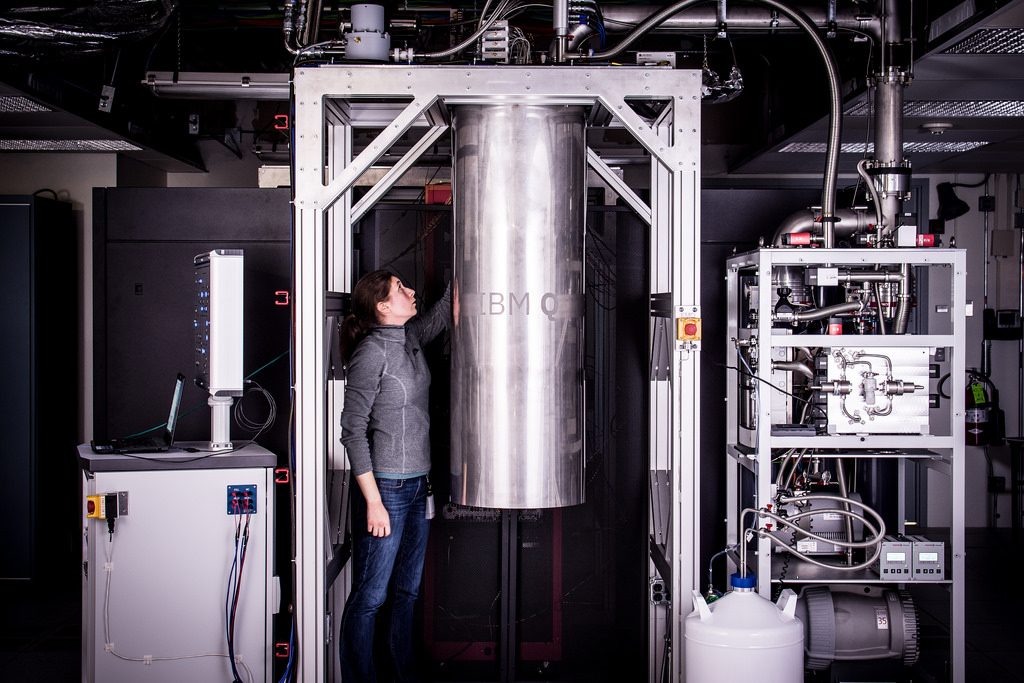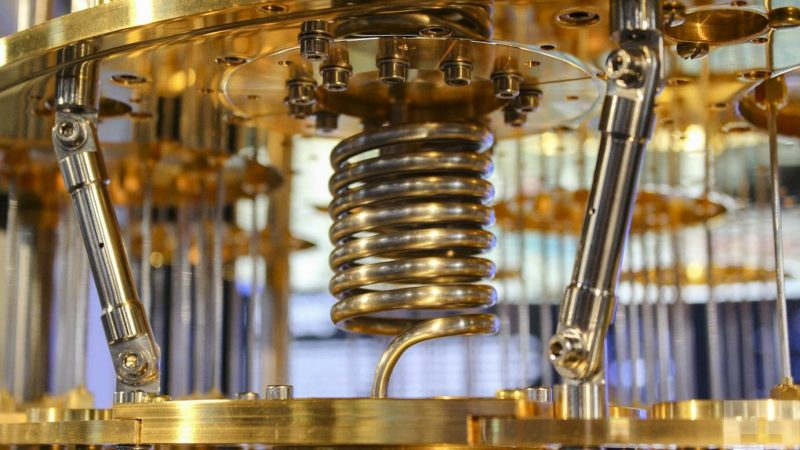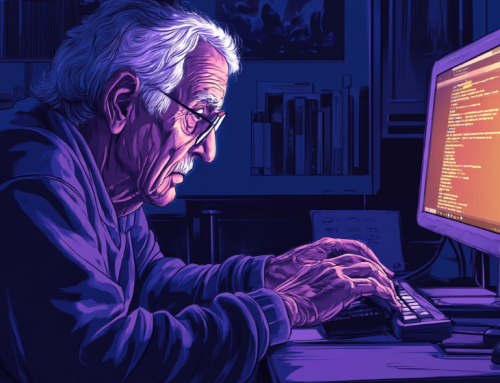Quantum Computers Test AI Potential & Time Shifts as Sector Waits
Russian scientists turned back time—by less than a second—on a quantum computer, the latest sign of quantum computing’s promise to revolutionize technology in the near future. In the UK, a project to mimic the neural networks of the brain could boost AI’s abilities. In addition, machine learning algorithms are expected to boost AI, according to a report. Also, a tech executive says companies in Seattle need to do more to prepare for the quantum revolution.

IBM Research Staff Member Katie Pooley, an Applied Physics PhD from Harvard who joined IBM in 2015, at the Thomas J Watson Research Center, is a process integrator on the IBM Q team. In the photo, Pooley is examining a cryostat with the new prototype of a commercial quantum processor inside. (Andy Aaron, IBM)
Time Bandits
According to a story in Futurism.com, the scientists reversed the flow of time backward by a fraction of a second in an experiment conducted by a team of physicists. They restored the IBM public quantum computer to the state it had been a second earlier. Gordey Lesovik, a quantum physicist from the Moscow Institute of Physics and Technology, led the research project at the Argonne National Laboratory in Illinois, involving thousands of experiments to attempt to reverse time on a single electron.
Nature.com published an abstract of the paper after it was accepted as a Nature Scientific Report.
Brain Game
Another research project at the UK’s Heriot-Watt Institute of Photonics and Quantum Sciences (IPaQS) seeks to create “radical new computer quantum devices” that can operate numerous AI tasks simultaneously, “vastly exceeding limitations of existing technology.” Typical AI can be trained to recognize human faces with a single photograph at a time, for instance, but a quantum neural network could be fed with thousands or even millions of pictures at once, then use the data to make decisions based on user feedback.
Professor Michael Hartmann from the School of Engineering and Physical Sciences at Heriot-Watt University is leading the Quromorphic Project to develop quantum computing hardware that mimics the functionality of neurons. In a press release, Hartmann said, “Like neurons, these new quantum devices made of superconducting electrical circuits will combine input signals to generate output or not. This mimics the decision-making process of the human brain where a combination of influences leads a person to make a decision. When combining circuits, powerful artificial intelligence emerges. In their quantum version these circuits are expected to process much more input signals and take many more decisions at the same time leading to vast speed improvements.”
ML-powered AI
Quantum computers are expected to supercharge AI through machine-learning algorithms, according to research by IBM scientists. They believe that quantum AI would be skilled at “feature mapping,” or breaking down data to map it at high speed. Machine learning could make that process even faster, and capable of handling massive amounts of data at once.
Seattle Not Ready
According to a column in Geekwire written by Madrona Venture Group co-founder Tom Alberg, Seattle needs to get ready for quantum computing breakthroughs by investing in building a quantum computing center in the region. Based on his impressions at the Northwest Quantum Nexus Summit, co-sponsored by Microsoft, the University of Washington and Pacific Northwest National Labs, Alberg thinks Seattle could be the hub of quantum activity. He quoted a speaker as saying that the tech world is on “the cusp of a quantum century” when quantum computers solve the problems outside of the abilities of classical computers, even after thousands of years.
“Even though the Seattle area is one of the top two technology centers in the U.S., along with the San Francisco Bay Area, we have to make investments now to ensure we become a leading quantum center. To achieve this goal, I argued that we will need to substantially increase financial support to build up the UW’s quantum research capacity and equally important, to create an extensive quantum information science curriculum. The UW’s Paul G. Allen School of Computer Science and Engineering began this year to offer a course teaching Microsoft’s Q# language, but one course is not enough if we are to make our area one of the major quantum centers of the future.”
Microsoft launched its own quantum initiative 10 years ago and is poised to be a leader, Alberg said. Additionally, the U.S. government will invest monies in quantum tech, though far short of China’s commitment.
“The federal government has recently launched the National Quantum Initiative, which will provide $1.2 billion over the next five years primarily to quantum researchers. The president signed the new law in December after the bill was approved by unanimous consent in the Senate and a 348-11 vote in the House. Among the purposes are to build a ‘quantum-smart workforce of the future and engage with government, academic and private-sector leaders to advance QIS.’ ”








Leave A Comment